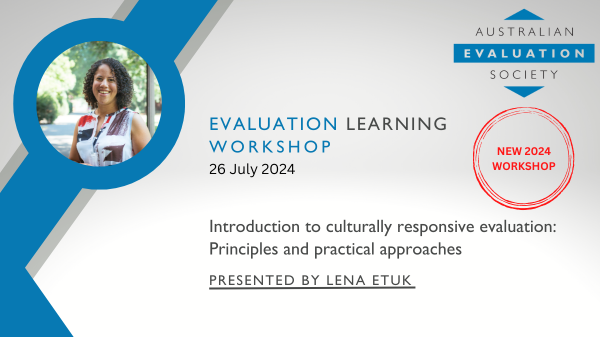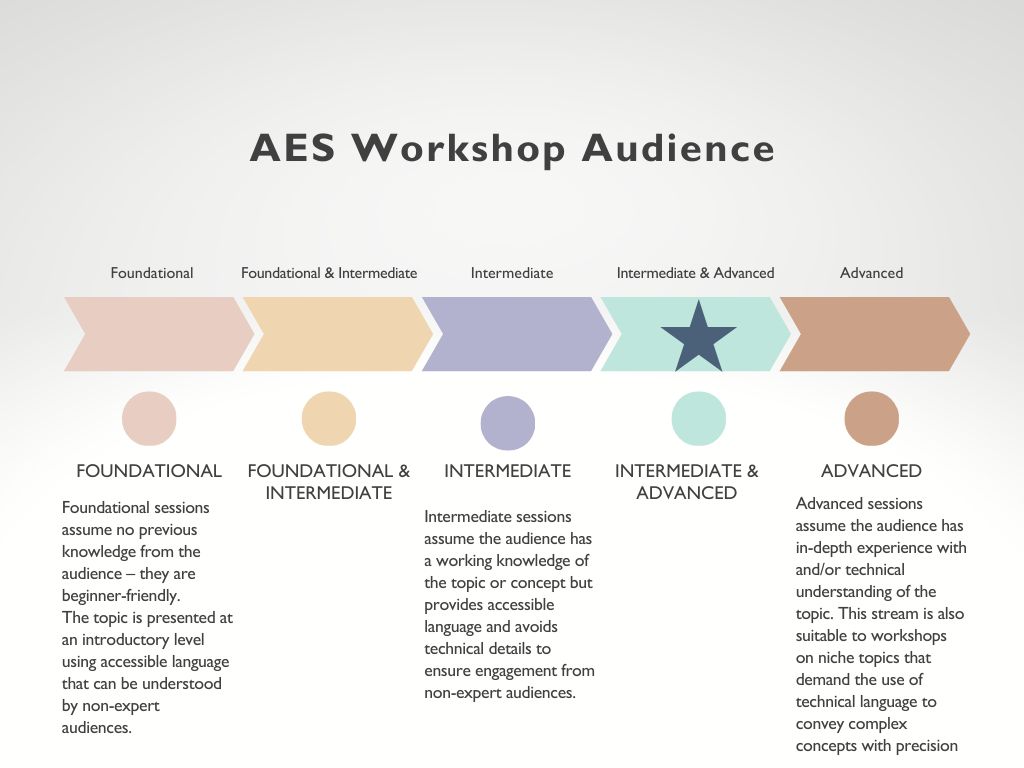Workshop: Introduction to culturally responsive evaluation: Principles and practical approaches (Online 26 July 2024)

Workshop: Introduction to culturally responsive evaluation: Principles and practical approaches
Date and time: Friday 26 July 2024, 9.30am to 12.30pm AEST (registration from 9.15am). Half day workshop - 1 session
Venue: Via Zoom. Details will be emailed to registrants just prior to the workshop start time
Facilitator: Lena Etuk
Register online by: Thursday 25 July 2024, unless sold out prior. Spaces limited to 25 participants
Fees (GST inclusive): Members $215.00, AES Organisational member staff $345.00, Non-members $385.00, Student member $125.00, Student non-member $180.00* (GST inclusive) * Students must send proof of their full-time student status to
Workshop Overview
This workshop is aimed at those who have been part of at least one evaluation project in the past. Its purpose is to give evaluators and those commissioning evaluations additional competencies, to ensure all evaluations are inclusive and thus representative. Specifically, the workshop will teach participants the principles behind culturally responsive evaluation as well as concrete ways to adjust and tweak existing evaluation methods (like logic models, theories of change, surveys, interviews, focus groups, observational methods, and reports) to make them more inclusive for diverse audiences. Throughout the workshop, participants will have the opportunity to learn from real cases as well as workshop their own current, past, or upcoming evaluation projects.
Workshop Content
This is a knowledge- and skill-building workshop that will provide attendees the opportunity to grow their understanding of evaluation and begin applying culturally responsive evaluation methods. Specifically, the workshop will cover the following:
-
Insight into the inclusive mindset that’s needed for this work and ways to cultivate that mindset
-
The needs of different cultural groups who may be stakeholders in an evaluation – i.e., program participants, program facilitators, community stakeholders, or funders of a program evaluation
-
How to identify opportunities to be more culturally inclusive
-
Checklist for Culturally Responsive Evaluation Design
-
How to make common evaluation methods more culturally inclusive
Workshop Outcomes
The purpose of the workshop is to provide attendees with an opportunity to reflect on the foundations of evaluation and how they need to be applied and adapted in the context of a multicultural, diverse population. This should improve their ability to conduct and commission, high-quality, representative evaluations.
PL competencies
This workshop aligns with competencies in the AES Evaluator’s Professional Learning Competency Framework. The identified domains are:
• Domain 1 – Evaluative attitude and professional practice
• Domain 2 – Evaluation theory
• Domain 3 – Culture, stakeholders and context
• Domain 4 – Research methods and systematic inquiry
• Domain 5 – Project management
• Domain 6 – Interpersonal skills
Who should attend?
Intermediate and Advanced
Those who have been part of at least one evaluation project in the past, as these principles and approaches are a set of tools to be incorporated into all core methods and theory underpinning the evaluation field. A basic level of understanding of evaluation is thus required.

Workshop start times
-
VIC, NSW, ACT, TAS, QLD: 9.30am
-
SA, NT: 9.00am
-
WA: 7.30am
-
New Zealand: 11.30am
For other time zones please go to https://www.timeanddate.com/worldclock/converter.html
About the facilitator
Lena Etuk is a leader in the field of culturally inclusive research. At the Cultural & Indigenous Research Centre Australia (CIRCA) Lena has led the development and refinement of culturally grounded research methodologies that are culturally safe, build relationships, and are culturally appropriate. In her role at CIRCA, Lena has led research and evaluations on a wide variety of topics including community alcohol and other drug treatment service needs; suicide; social housing; child protection; tobacco control; attitudes toward data collection, privacy, and dissemination; and health – all with a purpose of ensuring the perspectives of culturally and linguistically diverse Australians as well as Aboriginal and Torres Strait Islander peoples are heard and recognized.
Lena has had a significant research career in the academic and private sector, having been a professional researcher and evaluator since 2006. Since receiving her Master of Science in Sociology from the University of Wisconsin-Madison she’s published eight peer-reviewed research articles and one book chapter, and has produced four public, online data tools for policy makers. She has led research and evaluation projects for public, nonprofit, and private sector clients in the US and Australia, including The Ford Family Foundation (US), Oregon Department of Administrative Services (US), Commonwealth Department of Health & Aged Care (AUS), NSW Department of Customer Service (AUS), InvoCare (AUS), and Dementia Australia (AUS).
Event Information
| Event Date | 26 Jul 2024 9:30am |
| Event End Date | 26 Jul 2024 12:30pm |
| Cut Off Date | 25 Jul 2024 4:00pm |
| Location | Zoom |
| Categories | Online Workshops |
We acknowledge the Australian Aboriginal and Torres Strait Islander peoples of this nation. We acknowledge the Traditional Custodians of the lands in which we conduct our business. We pay our respects to ancestors and Elders, past and present. We are committed to honouring Australian Aboriginal and Torres Strait Islander peoples’ unique cultural and spiritual relationships to the land, waters and seas and their rich contribution to society.
